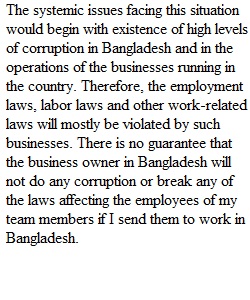


Q Imagine you are part of a senior management team of a small outdoor clothing manufacturing company. Your company has a history of good workers treated well by your “paternalistic” culture. Your company has just received an attractive offer from a business in Bangladesh to manufacturer work gloves (gloves represent about 40% of your sales revenue). This offer would allow substantial cost savings over the current supplier. A manager assigned to looking into this matter has just finished briefing all of you. She has read reports that some Bangladesh businesses break their own laws and operate with child labor. Her research discovered no evidence of this potential vendor violating any such laws. She has also expressed concern that many “staffers” (managers & supervisors) feel there is a moral issue of paying people-- much less children “subsistence level wages”. The rumors of this “alliance” have been apparent in the decreasing morale of the workforce realizing the potential of layoffs. It remains to be seen in detail but your CFO has stated in a preliminarily report that as many as 25%-33% of your employees could be terminated. Your company is privately held, known throughout the industry and marketplace for producing goods of quality and value. While sales growth has been slight, your company has remained profitable and is maintaining market share. Longer term you are very concerned that your main competitor has just been acquired by an extremely aggressive- market savvy and well-capitalized (10 times your capitalization) concern. The Bangladesh Company is looking for an answer now and is expected to contact your competitors if an appropriate arrangement cannot be made. 1. a. What are the systemic issues facing this situation? b. What are the unintended consequences if you go? What if you stay? c. What would you recommend? Why?
View Related Questions